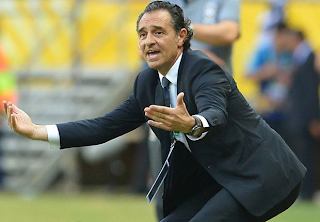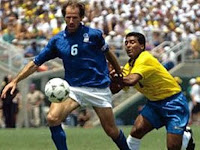The history of the Nazionale has been characterized by having legendary captains that, beyond being great football players, they were first incredible men with an immense sense of leadership and human value.
Let's be honest, the Nazionale never won titles purely relying on actual talent. Even though many of its leaders were very talented with the ball in their feet, it is not this quality that has given Italy the high amount of titles it has. If talent was the major component of a glorious team such as Italy, we would remember more the various Zola, Mancini, Chiesa, Di Natale rather than the various Gattuso, Dino Baggio, Oriali, Gentile and so on.

Of course, in such a rich history like the one of Italian football, it has also been the case that the leader of particular generation happens to be the most talented player in the team. Think of today's Nazionale: the two main leaders are Gianluigi Buffon and Andrea Pirlo. Do I need to say more? Both them are absolute top-class talents in the world of football, one as a goalkeeper and the other one as field player.
However, this is not always the case. It is a well known fact that every team, and even every player, achieves success by taking advantage of their own strengths to the fullest, and by relying the least they can on their biggest weaknesses. Essentially, a team whose players are not particularly good at heading the ball won't try to rely on air play to win matches.
The Italian Nazionale is a clear example of this. Analyzing pure talent player by player, we never have the best team. If we looked at the rosters or Argentina and Spain, for example, their players are much more talented than ours. Yet, Italy has one more World Cup than Argentina and Spain combined.
This happens because Italian players are almost always able to go beyond their capabilities. In decisive moments, they go through some kind of transformation in which they become stronger than everything and everyone: the other teams, the controversies, the media, negative supporters, and so on.
This point is demonstrated by the fact that, compared to other countries, some of our great heroes of our past are players who did not particularly had notorious careers other than one specific tournament at the highest levels.
The most recent example of this is, without a doubt, Fabio Grosso. For one single month, he became the world's best player as he achieved the ultimate dream of every kid around the world: Scoring the last penalty kick to give a country the title of champion of the world, in addition to scoring a late winner goal in a World Cup semifinal against the home team in a stadium in which such team had never lost before. These are experiences that even the history's best players could have the opportunity to live.
Along the Nazionale's history, there are many other examples. Salvatore Schillaci's celebrations are the most remembered images of the Nazionale in World Cup 1990. Scoring six goals, he became the main character of the famous "Notti Magiche" of the tournament, leading Italy to a final third place.
Like Grosso, Schillaci didn't also have a notorious career, besides the magnificent World Cup. Even though he should have been a world champion too, he only played five seasons in Italian Serie A, scoring "only" 37 goals. Insignificant to the 119 goals of Cristiano Lucarelli in Serie A, who barely played six games in Nazionale.

Even Paolo Rossi, who did have an overall great career, reached his maximum peak in World Cup 1982, leading Italy to the title of world champion in 1982 with six goals, including a hat-trick against the great Brazil.
Every generation of the Nazionale has always had a strong component of leadership, way beyond the actual player who wears the arm-band. This is exactly what makes Italy so glorious: being able to rely on great individuals that will give it all and act like leaders in decisive and specific moments:
- Dino Baggio scoring a late goal against Norway in World Cup1994, saving Italy and Sacchi from a huge shame.
- Fabio Cannavaro leading and starting the counter-attack in World Cup 2006 semifinal, recovering the ball twice in 5 seconds right when Germany was attacking trying to tie the game. The counter-attack resulted in Del Piero's goal.
- Marco Materazzi tying the final in 2006 after having caused the penalty kick for France, minutes before.
- Andrea Pirlo chipping the ball to Joe Hart in penalty series against England in Euro 2012. England was winning the series, and this episode totally sent British players out of their place.
- Tarcisio Burnich, center defender who never went beyond midfield, finally going forward and tying the semifinal vs Germany in World Cup 1970 semifinal in extra time right after Germany went up in the score board. The game of the century.
- Claudio Gentile being the worst (or maybe the only) nightmare of Maradona in World Cup 1982.
- Alessandro Del Piero playing as a side back for most of the Euro 2000 semifinal vs home team Holland, as the Nazionale played in 10 after Zambrotta's red card.
- Christian Panucci tying the match against Romania in Euro 2008, a minute after Romania scored.
I could go on forever with these examples. There are many more. As well as there are way more cases of "silent" leaders who were very important for Italy, like Gattuso, Oriali, and Giannini.
Italy, moreover, has also had the luck of being represented by heroic individuals who actually wore the arm-band. In the second part of this post, I will list and post pictures of all the main captains the Nazionale had in every single World Cup.
Thanks for reading and #ForzaItalia



























